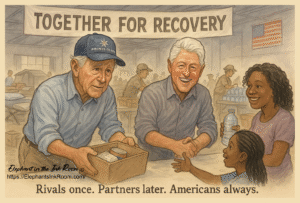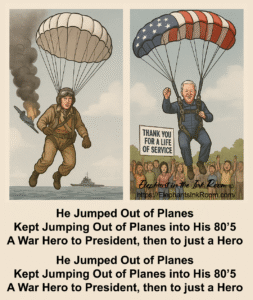President George H. W. Bush
On
- Real Men

/
RSS Feed
George H. W. Bush
“The Quiet Strength of a Life Well Lived”
41st President of the United States • WWII Hero • Diplomat • Humanitarian
Before politics, before power, and long after the spotlight faded, George H. W. Bush led a life defined not by ego, but by service. In an era increasingly obsessed with celebrity and dominance, Bush represented something rare: a man who could lead without the need to be worshipped.
From Cockpit to Character
Bush enlisted in the U.S. Navy on his 18th birthday during World War II — becoming the nation’s youngest naval aviator at the time. He flew 58 combat missions, was shot down over the Pacific, and rescued by submarine. For completing his bombing run even as his plane burned, he earned the Distinguished Flying Cross.
That moment of courage wasn’t just a war story. It was a window into a life defined by duty, sacrifice, and resolve — values that remained steady through war, peace, politics, and personal tragedy.
The Businessman Who Didn’t Brag
After the war, Bush attended Yale and moved to Texas to build a life from scratch in the oil industry. He co-founded Zapata Offshore, achieving financial success quietly, without the bravado or headlines. His wealth wasn’t flaunted — it enabled him to serve, not to posture.
Service in Every Season
Bush’s rise through public service was old-school and hands-on:
-
Congressman.
-
U.N. Ambassador.
-
Envoy to China.
-
CIA Director.
-
Vice President.
He accepted each role with humility, rarely complaining, never self-promoting.
A Presidency of Prudence and Principle
As President, he navigated some of the most delicate moments in modern history:
-
Oversaw the peaceful end of the Cold War.
-
Managed the reunification of Germany.
-
Built a broad coalition to repel Saddam Hussein from Kuwait.
-
Signed the Americans with Disabilities Act.
-
Called Americans to service with his “Thousand Points of Light” — a lasting initiative that celebrated community and volunteerism over ideology.
He was mocked for being careful with his words, thoughtful in his diplomacy, and unwilling to boast. But history has grown kinder with time.
Loss, Grief, and Grace
In 1953, he and Barbara lost their daughter Robin to leukemia. It left a wound that never fully healed — but it also deepened their compassion and drove their charitable work. Later in life, his devotion to Barbara and their family stood in contrast to the performative masculinity often worshipped in politics.
Post-Presidency: The Best Years?

Bush’s most admired acts may have come after he left office:
-
The Letter to Clinton (1993): After losing reelection, Bush left a handwritten note in the Oval Office — gracious, hopeful, and supportive. A final act of statesmanship.
-
Bipartisan Humanitarianism:
Teamed with Bill Clinton to raise over $100 million for global disaster relief. Their friendship became iconic — a reminder that decency can rise above party.
-
A Volunteer to the End:
Continued parachuting into his 70s and 80s — not for headlines, but to honor his past and inspire others.
Through the Points of Light Foundation, he kept calling Americans to serve — not a party, but each other.
Legacy Beyond Power
He lived to see his son become President — and handled both agreement and disagreement with quiet dignity. He outlived his wife by just months, and was laid to rest with her and daughter Robin, carried by the same plane he once flew into war.
Final Reflection:
George H. W. Bush may not have tweeted. He didn’t insult his rivals. He didn’t stage rallies for applause.
But he did risk his life for his country, govern with humility, admit mistakes, extend a hand to his opponents, and continue serving long after power was gone.
Quote to Frame It All:
“Any definition of a successful life must include service to others.”
— George H. W. Bush



Comments are Disabled